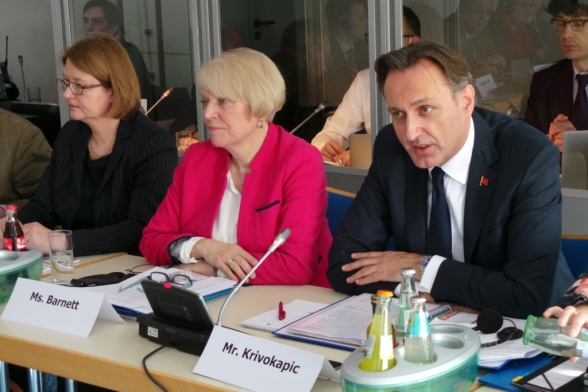President Mr Ranko Krivokapić reminded, in his introductory speech, of the activities by the OSCE PA aimed at deescalation of the crisis and establishment of the Vienna Process for the dialogue between the Russian-Ukrainian parliamentarians.
“It was a timely response of the OSCE PA having in mind that it was a period of culmination of the crisis when the entire international community faced the great challenge of reaction to newly established circumstances”, President Krivokapić said.
He said that in that way parliamentarians of both countries have shown a high level of responsibility and decisiveness to sit at table in the time of crisis and talk about the best parliamentary responses.
“Parliaments cannot do what may and should be done by other structures, but they may open a space for a dialogue and building of trust, which is an ultimate precondition of every serious approach in solving the existing conflict”, Mr Ranko Krivokapić, OSCE PA President Emeritus, said.
He stressed the importance of today’s gathering of parliamentarians, since the very place of the meeting was, through history, a place of constant fights of two big states such as Germany and France, which are today two friendly states and synonyms of democracy and economic prosperity, making thus the pillar of the European Union.
In that context, Mr Krtivokapić underlined that the best example for that were border arears, which, regardless of numerous historic traumas, may be connection bridges rather than separation and fights.
“That is precisely our mission, mission of the OSCE PA - through continuity of these meetings, which, in addition to official talks have, what is particularly important, its informal part - to create conditions for Russia and Ukraine to follow the example of these two big European states”, Mr Krivokapić noted.
OSCE Vice President Ms Doris Barnet voiced pleasure over the continuation of talks of parliamentarians of the two countries regarding the concreate topics and particularly thanked to Mr Ranko Krivokapić, OSCE PA President Emeritus, on his commitment to lead the Vienna Process which have been deepening a dialogue and thus helped the more realistic consideration of various aspects of the existing conflict.
The gathering was also attended by Mr Michael Georg Link, Director of the Office for Democratic Institutions and Human Rights, dealing with monitoring and control of conducting elections in the OSCE countries.









